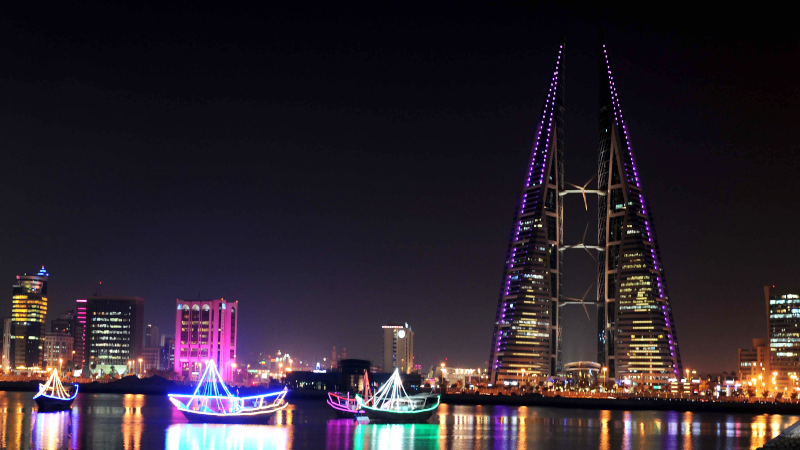Bahrain: A Pearl in the Arabian Gulf
Related Articles: Bahrain: A Pearl in the Arabian Gulf
Introduction
In this auspicious occasion, we are delighted to delve into the intriguing topic related to Bahrain: A Pearl in the Arabian Gulf. Let’s weave interesting information and offer fresh perspectives to the readers.
Table of Content
Bahrain: A Pearl in the Arabian Gulf

Bahrain, an island nation nestled in the heart of the Arabian Gulf, holds a unique position within the Middle East. Its strategic location, rich history, and dynamic economy make it a significant player in the region’s affairs. Understanding Bahrain’s geography, culture, and political landscape provides valuable insight into the complexities of the Middle East.
A Glimpse of Geography:
Bahrain is an archipelago comprised of 33 islands, with the main island, Bahrain Island, encompassing approximately 85% of the total landmass. The island nation boasts a diverse landscape, ranging from the fertile plains of the north to the arid desert regions of the south. Its coastline, characterized by pristine beaches and coral reefs, offers a stunning backdrop for tourism and recreation.
A Rich Tapestry of History:
Bahrain’s history stretches back millennia. Archaeological evidence suggests human settlements dating back to the Dilmun civilization, a powerful maritime trading empire that flourished from the third millennium BCE to the second century BCE. The island served as a key trading hub for centuries, connecting civilizations across the ancient world.
During the Portuguese colonial era, Bahrain witnessed the rise and fall of various rulers, including the Portuguese, the Persians, and the Ottomans. The nation’s modern history is marked by the establishment of the Al Khalifa dynasty in 1783, who continue to hold the reins of power today.
A Flourishing Economy:
Bahrain’s economy has undergone significant transformation in recent decades. The nation’s strategic location and commitment to economic diversification have propelled it to become a regional financial hub. Its banking sector, particularly its Islamic banking industry, is renowned for its innovation and efficiency.
The discovery of oil in the 1930s played a crucial role in shaping Bahrain’s economic trajectory. However, the nation has actively pursued alternative sources of revenue, focusing on sectors like tourism, manufacturing, and technology. The development of the Bahrain Financial Harbour, a modern business district, exemplifies the nation’s ambition to become a leading financial center in the Middle East.
A Cultural Mosaic:
Bahrain’s diverse population reflects its rich history and cosmopolitan nature. The majority of the population is Bahraini, with a significant number of expatriates from various parts of the world. This cultural fusion has resulted in a vibrant and dynamic society where traditions and modernity coexist harmoniously.
The nation’s cultural heritage is evident in its architectural landmarks, traditional crafts, and cuisine. Bahrain’s vibrant arts scene, encompassing music, theatre, and visual arts, reflects the nation’s creative spirit.
A Vital Role in the Middle East:
Bahrain’s strategic location has made it a crucial player in regional affairs. The nation’s close ties with neighboring countries, particularly Saudi Arabia, have contributed to its stability and economic prosperity. Bahrain’s involvement in regional organizations like the Gulf Cooperation Council (GCC) has further strengthened its position in the Middle East.
The nation’s commitment to promoting regional cooperation and fostering economic development has earned it recognition as a reliable partner in the region. Bahrain’s efforts to promote dialogue and understanding among diverse cultures have contributed to the broader goal of peace and stability in the Middle East.
FAQs:
1. What is the official language of Bahrain?
The official language of Bahrain is Arabic. However, English is widely spoken, particularly in business and government circles.
2. What is the currency of Bahrain?
The official currency of Bahrain is the Bahraini Dinar (BHD).
3. What is the climate like in Bahrain?
Bahrain experiences a hot and arid climate with very little rainfall. Summers are extremely hot and humid, while winters are mild and pleasant.
4. What are some popular tourist attractions in Bahrain?
Bahrain offers a variety of tourist attractions, including:
- The Bahrain Fort: A UNESCO World Heritage Site, this ancient fort provides a glimpse into Bahrain’s rich history.
- The Tree of Life: A lone acacia tree that stands in the desert, defying the harsh environment.
- The Bahrain National Museum: A comprehensive collection of artifacts showcasing Bahrain’s history and culture.
- The Bahrain International Circuit: Home to the Formula One Bahrain Grand Prix, this world-class racing facility attracts motorsport enthusiasts from around the globe.
5. What are the visa requirements for visiting Bahrain?
Visa requirements vary depending on the nationality of the visitor. Some nationalities can obtain visas on arrival, while others need to apply for a visa in advance.
Tips for Visiting Bahrain:
- Respect local customs and traditions: Dress modestly and be mindful of social norms.
- Learn a few basic Arabic phrases: This will enhance your interactions with locals.
- Bargain for souvenirs: Haggling is common in local markets.
- Try the local cuisine: Bahrain offers a diverse culinary scene, with a blend of Arabic and international flavors.
- Explore the island’s hidden gems: Venture beyond the main tourist attractions to discover Bahrain’s unique character.
Conclusion:
Bahrain, a small island nation in the Arabian Gulf, holds a significant position in the Middle East. Its strategic location, rich history, and dynamic economy make it a vital player in regional affairs. From its ancient past to its modern aspirations, Bahrain continues to evolve, offering a captivating blend of tradition and modernity. As the nation continues to strive for economic diversification and regional cooperation, its future holds immense promise. Understanding Bahrain’s unique characteristics and its role in the Middle East provides valuable insight into the complexities of the region and its potential for growth and prosperity.







/travelscapes/media/media_files/ZCG9UzgEQT5FUxvi1LFH.jpg)
Closure
Thus, we hope this article has provided valuable insights into Bahrain: A Pearl in the Arabian Gulf. We hope you find this article informative and beneficial. See you in our next article!